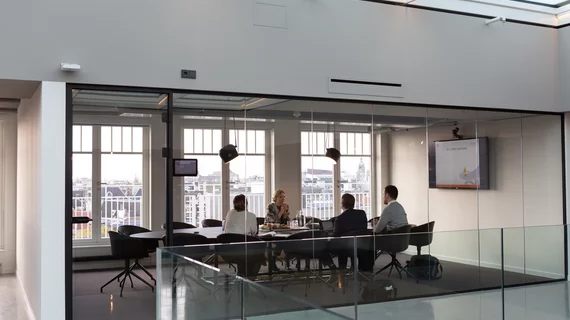Aidoc, Avicenna, Viz.ai and 10 more imaging AI names in the pre-RSNA news
Noteworthy market developments in radiological AI as announced during November’s runup to RSNA by the suppliers marketing the offerings. Items are listed in the order received.
Also worth a look: the ACR Data Science Institute’s AI Central, updated this week with detailed information on imaging AI products that have been cleared by the FDA.
> Aidoc (Tel Aviv) collaborates with Temple Health (Philadelphia) to operationalize AI care platform across radiology, cardiovascular and neurology service lines (Nov. 1). Temple Health EVP and CFO Nick Barcellona, MBA: “As the challenges of sustaining delivery of high-quality care continue to mount, we continue to seek solutions that can accomplish two things—support our physicians in improving clinical efficiency and reducing the overall cost to deliver the care. We believe these AI solutions, for both medical imaging and care coordination, will give our physicians the tools they need to streamline clinical processes.”
> Viz.ai (San Francisco and Tel Aviv) partners with Us2.ai (Singapore) on AI-automated cardiac ultrasound and care coordination for patients with suspected heart disease (Nov. 2). Viz.ai CEO Chris Mansi: “The average time to complete an echo takes up to 60 minutes, plus additional reporting time. Using AI can dramatically reduce this time burden, as well as ensure a uniform standard of excellence in reporting.”
> Enlitic (Fort Collins, Colo.) and Vital Radiology Services (Hertfordshire, U.K.) install Enlitic’s Curie platform in Vital’s radiology reporting system to augment its PACS for optimal efficiency (Nov. 10). Vital medical director Dr. Ash Bhagat: “Our radiologists are a patient lot. They understand the challenges of reading for multiple sites and how it impacts their workflow. We are excited to get rolling with Enlitic and directly positively impact the reporting workflow for our radiologists.”
> Visionable (London, U.K.) and Brainomix (Oxford, U.K.), partnering on AI-expedited stroke care (Nov. 10). Dr. Sajid Alam, stroke consultant at Ipswich Hospital: “We don’t have ready access to dedicated neuroradiologists to interpret every stroke scan, [so] having the AI software gives us more confidence when interpreting each scan—particularly the CT angiographies, where we look for a large vessel occlusion, a key indicator of patient eligibility for mechanical thrombectomy.”
> Calyx (Nottingham, U.K.) partners with Neosoma (Groton, Mass.) on development and distribution of AI-automated volume measurement of malignant brain tumors (Nov. 17). Calyx CMO Stephen Bravo, MD: “Neosoma’s expertise in AI imaging development nicely complements Calyx’s two decades of experience in clinical trial imaging and the insights we’ve gleaned from having successfully supported nearly 100 neuro-oncology clinical trials.”
> See-Mode Technologies of Melbourne, Australia, wins approval from Health Canada for AI-automated analysis of breast and thyroid ultrasound (Nov. 17). See-Mode co-founder Milad Mohammadzadeh, PhD: This regulatory approval “demonstrates the applicability of our software beyond the vascular studies we currently support.”
> Sirona Medical (San Francisco) partners with RevealDX (Seattle), Triad Radiology Associates (Winston-Salem) and Hackensack Radiology Group (New Jersey) on AI-automated lung nodule measurement and high-risk nodule identification (Nov. 17). Triad CEO and RevealDX CMO Lauren Nicola, MD: “We’re developing this in response to a need for AI applications to be seamlessly integrated into radiologist workflow.”
> Avicenna.AI (Marseille, France) signs distribution agreement with Carpl.ai (San Francisco) to bring AI-based detection and alerting of various pathologies on CT imaging, including neurovascular and thoraco-abdominal pathologies (Nov. 22). Avicenna CEO Cyril Di Grandi: “We’re excited to partner with a leading platform like Carpl, which has a strong presence in key new markets for us, including Australia, Brazil and India. They are also deployed in many large hospital environments, which is exactly what our solutions are designed for.”

